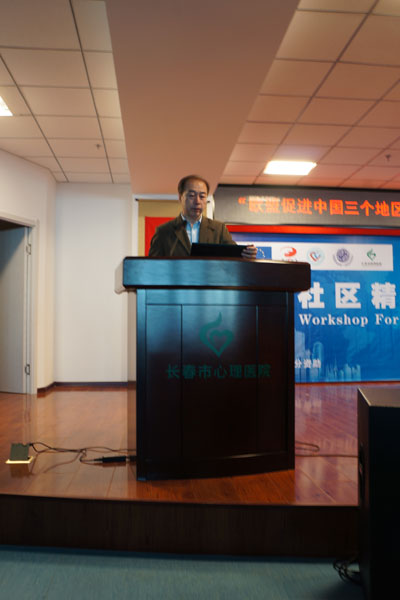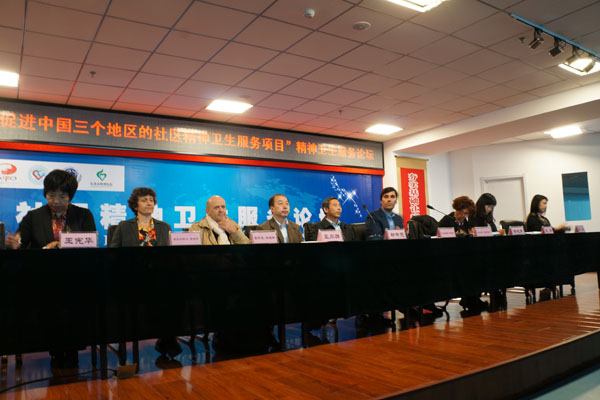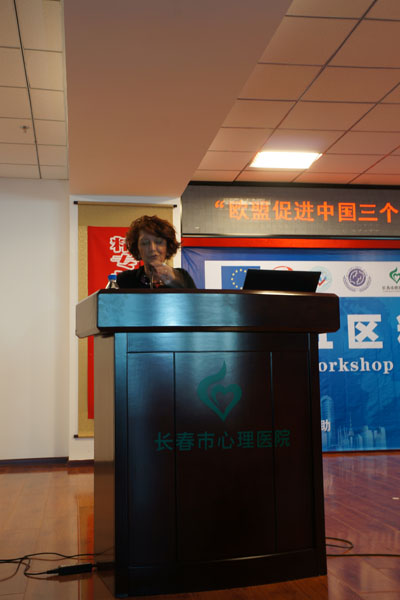Chinese cities trial residential psychiatric care
- By Wu Jin
 0 Comment(s)
0 Comment(s) Print
Print E-mail China.org.cn, October 10, 2013
E-mail China.org.cn, October 10, 2013
Liu Yang, from Changchun in Jilin Province has few opportunities to travel outside his hometown. Because of his mental illness, he can hardly talk to others, let alone travel around.
But in the coming week, he and his mother are planning on a two-day visit to neighboring Jilin, thanks to the open community recuperation service (Residential Open Unit) in the Changchun Sixth Hospital, Nanguan District, which gives patients the freedom to communicate with the world outside.
|
Doctors and officials recently discuss "Residential Open Unit" for psychiatric patients in Changchun, Jilin Province. [China.org.cn] |
In Nanguan District of Changchun City has been launched the first Residential Open Unit (ROU) for psychiatric patients in July 2013 with the technical support of Peking University Institute of Mental Health (PUIMH)/Sixth Affiliated Hospital of Peking University, and in collaboration with Solidarieta’e Servizio (SeS) and Associazione Italiana Amici di Raoul Follereau (AIFO) that are partners in a specific action co-funded by European Union.
"The opening of the Community Mental Health Units (CMHU) and ROU in the district played active roles in raising the quality of life for psychiatric patients over the past three years,”"said Xi Shuyuan, vice director of the Health Bureau of Changchun, at the opening ceremony of the Forum for Community Mental Health Service held from Sept. 26 to 28.
So far, in the city has been organized Community Based Psychiatric services that give a possibility to Psychiatric Hospital to walk out of the wards and return to society, in line with China's New Mental Health Law of May 2013 that promote the dignity of psychiatric patients.
|
Giovanna Del Giudice, an Italian psychiatrist delivers speech at the forum. [China.org.cn] |
The concept of "Residential Open Unit" was coined by Italian psychiatrist Franco Basaglia who initiated a law in 1978, closing down psychiatric wards so that people with mental illnesses could live as community residents. The psychiatric service in Italy has matured over the past four decades, and the country is now completely free of asylums.
"The NO. 108 Law [initiated by Franco Basaglia], which enables psychiatric patients to decide their own destiny, has made our dreams come true," said Giovanna Del Giudice, an Italian psychiatrist and a panelist in the forum.
"Despite all the difficulties, the law enables psychiatric patients more rights and requires the society to respect their choices," she said.
In 2008, a chartered train filled with psychiatric patients traveled from Venice, Italy to China, as Marco Polo did in the thirteen Century. In February 2009, a group of Chinese psychiatrists also visited Trento, Italy, to learn from their experiences with ROUs.
In 2009, Rosa Villa, the first ROU funded by SeS, was established in Haidian District, Beijing. The model was expanded to Hadian District, Beijing, Tongling, in Anhui Province, and Changchun in Jilin Province, in partnership with PUIMH.
"We aim to eliminate discrimination and social bias against [psychiatric patients] and we are trying to change people's stereotyped ideas about these patients fundamentally," said Wang Xiangqun, a doctor from the PUIMH.
Discrimination against psychiatric patients remains severe in many parts of China. According to Liu Yang's mother, she does not dare talk about her son's true condition with her neighbors in fear that they will gossip. According to Wang, the ROUs are the first step after leaving hospital in helping those with mental illnesses return to society. However, help from family members and communities is more important in rebuilding patients' confidence and happiness.
 |
|
Wang Xiangqun, doctor from the PUIMH [China.org.cn] |
Yet the community service cannot be described as "high-standard," according to Li Zhi, a doctor from the Changchun Sixth Hospital.
"When working with the community-level hospitals, we found that many doctors are not professional and they change jobs frequently, therefore, we cannot give them systematic training on how to treat psychiatric patients."
However, Wang argued that the hospitals are merely there for technical support for communities. The government can build the half-way homes for psychiatric patients. Those who work for the ROUs can be people like family members and volunteers, who do not need a large amount of professional knowledge.
Dr. Giovanni Gazzoli, Project Manager of the AIFO, said that mental health and the organization of Community based Psychiatric Services (CMHU and ROU) is an issue that requires support from all areas of society, and not only from mental health services.








Go to Forum >>0 Comment(s)